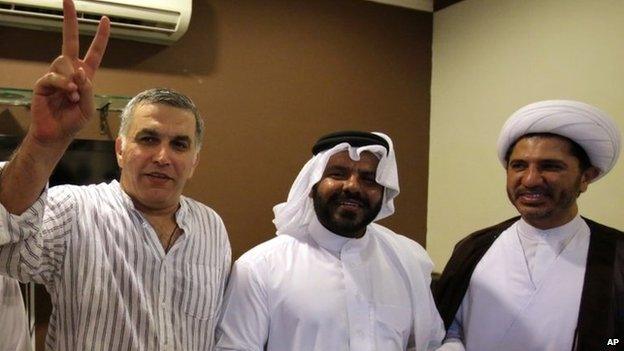Bahrain activist Nabeel Rajab urges serious dialogue
- Published

Nabeel Rajab (left) said the government did not want to share power with the opposition
Human rights activist Nabeel Rajab says he would talk to the government to end the political deadlock in Bahrain, following his release from prison.
But in an interview, he warned that the state was not serious about reform and meaningful dialogue with its opponents.
Months of talks between the government and opposition to resolve ongoing unrest were suspended in January.
Mr Rajab was freed on Saturday after completing a two-year sentence for organising "unauthorised" protests.
Fellow human rights activists considered him a prisoner of conscience whose legitimate work the Gulf kingdom had attempted to silence.
'Playing for time'
Before his imprisonment in July 2012, Mr Rajab was repeatedly detained in connection with the pro-democracy protests that erupted the previous year.
While Mr Rajab was in detention, the Sunni-led government continued clamp down on peaceful protests and to arrest and intimidate leaders of the Shia-dominated opposition. At the same time, bombings and other attacks on security forces personnel became more frequent.
Mr Rajab argued that the key to stopping violence was to end the ban on peaceful demonstrations
Asked if he would speak with officials to help break the deadlock, Mr Rajab replied: "I am a human rights activist and that determines my relationship with the government, so I would not refuse to meet anybody if that would help the situation."
But he warned: "There is no attempt to have a proper dialogue with the opposition. The government is not serious. It is just playing for time."
"The royal family does not want to see a balance of power. They want everything in their hands and as long as that is their attitude we are not likely to reach a solution," he added.
The opposition's demands include judicial reform, electoral reform, release of opposition political prisoners, and an elected government with full legislative powers.
'Redouble our efforts'
Mr Rajab said the situation in Bahrain was worse now than when he was jailed, citing legislation aimed at stopping online criticism and the increased violence.
Those who advocated violence were "without hope", Mr Rajab warned
The majority still believed in a peaceful struggle, but a minority calling for violence was "a normal reaction when you detain all who call for peaceful change", he warned.
Despite the restrictions on dissent and the risk of being imprisoned, Mr Rajab insisted he would continue to speak out on human rights issues.
"Laws were made while I was in prison that gave the king, the army, and the ministry of the interior immunity from criticism. The country has turned into a dictatorship. I know that I will have to be more careful but I also know I am going to talk."
Mr Rajab argued that the key to stopping violence was to end the ban on peaceful demonstrations and restrictions on freedom of expression.
"Some of the people who have come to my home say that the peaceful struggle has failed. But I say that we have to redouble our efforts, show them that peaceful struggle has not failed and by doing so we can slowly, slowly lower the level of violence."